Related Research Articles

The European Organization for Nuclear Research, known as CERN, is an intergovernmental organization that operates the largest particle physics laboratory in the world. Established in 1954, it is based in Meyrin, western suburb of Geneva, on the France–Switzerland border. It comprises 23 member states. Israel, admitted in 2013, is the only non-European full member. CERN is an official United Nations General Assembly observer.

Agnes Bernice Martin was an American abstract painter known for her minimalist style and abstract expressionism. Born in Canada, she moved to the United States in 1931, where she pursued higher education and became a U.S. citizen in 1950. Martin's artistic journey began in New York City, where she immersed herself in modern art and developed a deep interest in abstraction. Despite often being labeled a minimalist, she identified more with abstract expressionism. Her work has been defined as an "essay in discretion, inwardness and silence."

Rafael Lozano-Hemmer is a Mexican-Canadian electronic artist who works with ideas from architecture, technological theater and performance. Lozano-Hemmer lives and works in Montreal and Madrid.
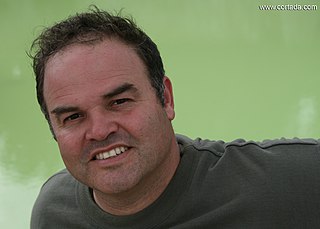
Xavier Ignacio Cortada is an American eco-artist, public artist and former lawyer. As a National Science Foundation Antarctic Artists and Writers Program fellow and a New York Foundation for the Arts Sponsored Artist, Cortada created works at the North Pole and South Pole to generate awareness about global climate change.
ISEA International is an international non-profit organisation which encourages "interdisciplinary academic discourse" and exposure for "culturally diverse organisations and individuals working with art, science and technology."
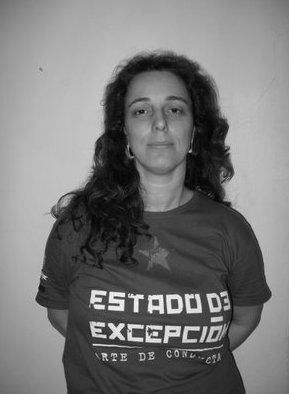
Tania Bruguera is a Cuban artist and activist who focuses on installation and performance art. She lives in Cambridge, Massachusetts where she works as head of media and performance at Harvard University. Bruguera has participated in numerous international exhibitions. her work is in the permanent collections of many institutions, including the Museum of Modern Art and Bronx Museum of the Arts and the Museo Nacional de Bellas Artes de La Habana.

Alexandre Arrechea is a Cuban visual artist. His work involves concepts of power and its network of hierarchies, surveillance, control, prohibitions, and subjection.
Agnes Denes is a Hungarian-born American conceptual artist based in New York. She is known for works in a wide range of media—from poetry and philosophical writings to extremely detailed drawings, sculptures, and iconic land art works, such as Wheatfield — A Confrontation (1982), a two-acre field of wheat in downtown Manhattan, commissioned by the Public Art Fund, and Tree Mountain—A Living Time Capsule (1992–96) in Ylöjärvi, Finland. Her work Rice/Tree/Burial with Time Capsule (1968–79) is recognized as one of the earliest examples of ecological art. She lives and works in New York City.
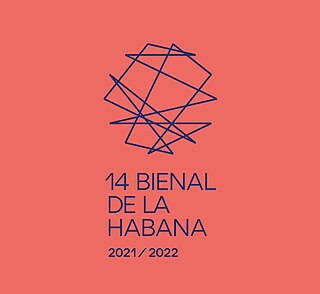
The Bienal de La Habana was an traditional Latin, Caribbean event, originated in Havana, Cuba, that aims to raise awareness to promote contemporary art and giving priority to Latin-American and Caribbean artists.
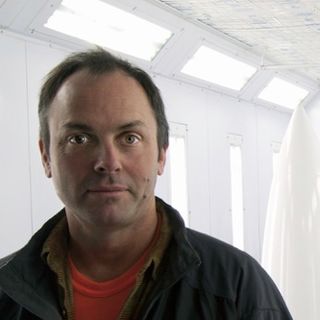
Charles Lindsay is an American multi-disciplinary artist whose work focuses on technology, biomimicry, semiotics, and the possibility of new ontologies. He creates immersive environments, sound installations, and sculptures built from salvaged aerospace and bio-tech equipment, photographs, and videos.

Shilpa Gupta is a contemporary Indian artist based in Mumbai, India. Gupta's artistic practise encompasses a wide range of mediums, including manipulated found objects, video art, interactive computer-based installations, and performance.
Glenda León is a Cuban artist born in Havana, in 1976.

Marc Lee is a Swiss new media artist working in the fields of interactive installation art, internet art, performance art and video art.

Nina Yankowitz is an American visual artist known for her work in new media technology, site specific public works, and installation art. She is a National Endowment for the Arts fellow, and a Pollock-Krasner Foundation Award recipient.
Laura Parker is an American conceptual, installation, and social practice artist. She is best known for her participatory installations and large scale drawings that address themes of food, agriculture, and soil, which have played a role in the back-to-the-land movement, food-to-table movement, and Locavore movement in California. Her participatory art installations and philosophy on soil, terroir, and locality have influenced Michelan star restaurants, wineries, and celebrity cookbooks, including Insalata’s Restaurant in San Anselmo and Robert Mondavi Winery and chef Robert Reynolds.
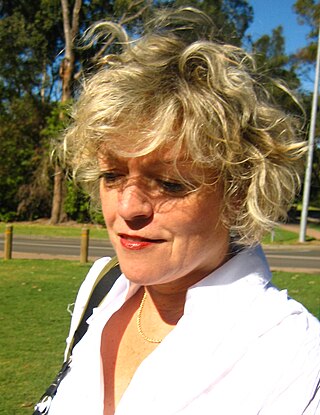
Ingrid Bachmann is a Canadian contemporary artist based in Montreal known mostly for her interactive kinetic sculptures that mix technology and ordinary everyday objects. Her work has been exhibited throughout Canada, and internationally in the United States, Peru, Brazil, Germany, Belgium, Scotland, Australia and Cuba. Exhibitions include the 11th Havana Biennial (Cuba), the Quebec Biennial, Manifestation d’art International 6 (Canada), Flesh of the World (Canada), Command Z: Artists Exploring Phenomena and Technology (USA), and Lab 30 (Germany).
Yu-Chen Wang is a British-Taiwanese artist and curator. She is based in London, UK, working internationally.

Amanda Phingbodhipakkiya is a multidisciplinary artist and speaker based in Brooklyn, New York. She is behind the project I Still Believe in Our City and Beyond Curie. Phingbodhipakkiya is a neuroscientist-turned-artist and an advocate of STEM who is known for conveying complex scientific ideas via art. As an artist, Phingbodhipakkiya works with murals, textiles, sculptures, public art campaigns and participatory installations and her art often touches on themes of AAPI, women, STEM, and human rights issues.

Özge Samancı is a Turkish-American media artist, and associate professor at Northwestern University`s School of Communication. She creates media art installations and graphic novels. Her art installations merge computer code and bio-sensors with comics, animation, interactive narrations, performance, and projection art. Her installations use media arts to break down people's mental and emotional barriers and hear about environmental issues. Her graphic novels combine drawings with three-dimensional objects.
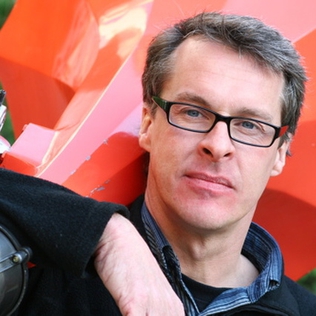
Daniel Jolliffe was a Canadian media artist and art professor who created works of art, design and performance projects using technologies such as Global Positioning Systems (GPS).
References
- 1 2 3 4 5 6 Dovalpage, Teresa (19 May 2015). "From Taos to Havana". The Taos News. Archived from the original on 29 July 2015. Retrieved 28 May 2015.
- 1 2 3 Mentzinger, Bob (18 March 1993). "Chavez Mixes Nature, Technology in MRM Show". The Taos News.
- ↑ Rico, Diana (2018-05-01). "Artist Agnes Chavez on Art and Science Education - Hip Latina". HipLatina. Retrieved 2019-09-12.
- 1 2 3 4 "Agnes Chavez | A Cuban-American multi-media artist and educator". Taos.org. 2016-11-10. Retrieved 2019-09-12.
- ↑ "Exhibition/Performances". ISEA 2012. 2012. Archived from the original on 2015-05-29. Retrieved 29 May 2015.
- ↑ "(x)Trees | About the artist". www.agneschavez.com. Retrieved 28 May 2015.
- 1 2 Brickley, Kim (17 May 2012). "The Developing Medium of Interactive Technology". Title Magazine. Retrieved 28 May 2015.
- ↑ Salem, Nancy (July 2012). "Albuquerque in the Global Spotlight" (PDF). Art Ltd. Magazine: 22–23. Archived from the original (PDF) on 23 September 2015. Retrieved 28 May 2015.
- ↑ Kelly-Yahner, Kyle (19 November 2012). "Art, Data and Building Trees from Texts: Tracing The Roots of (x)Tree". Twilio Blog. Retrieved 28 May 2015.
- ↑ Taos Chamber of Commerce (11 January 2011). Artist Agnes Chavez Creates Social Media (Video). 4:30 minutes in.
- ↑ "Agnes Chavez @ CERN (17 March 2015)". CERN Events. Indico. March 2015. Retrieved 28 May 2015.
- ↑ Auguilar, Juliane (27 May 2015). "That's a wrap!". Agnes Chavez Studio. Archived from the original on 2015-05-30. Retrieved 28 May 2015.
- 1 2 "Projecting Particles 2015" (PDF). Indico. March 2015. Retrieved 28 May 2015.
- 1 2 3 "Sube, Inc". WESST. Archived from the original on 2015-05-29. Retrieved 29 May 2015.
- ↑ Taos Chamber of Commerce (11 January 2011). Artist Anges Chavez Creates Social Media. 2:30 minutes in.
- 1 2 3 Propp, Wren (9 November 2004). "El Prado, N.M. Educator Creates Kits to Help Teach Spanish,English" . Albuquerque Journal. Retrieved 28 May 2015.
- ↑ Wittmann, Teresa; Mandell, Phyllis Levy (February 2005). "SUBE ESL Kit, Level K". School Library Journal. 51 (2): 79. ISSN 0362-8930.
- ↑ Pugh, Nikki Lyn (25 September 2014). "'The Paseo' Offers Spectuacular Opening to 40th Taos Fall Arts". The Taos News. Archived from the original on 11 January 2015. Retrieved 28 May 2015.
- ↑ "STEMArts | Home". STEMArts. Sube, Inc. Retrieved 28 May 2015.
- ↑ "The Paseo. Pt. 1: Janet Webb". Taos.org. 2018-09-12. Retrieved 2019-09-12.